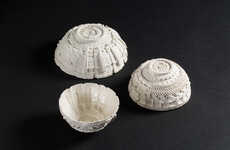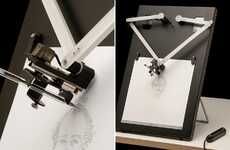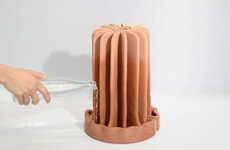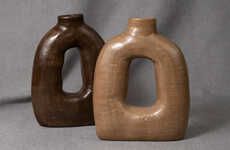
Charlotte Nordmoen's Pottery Maker Utilizes a Precise Robotic Arm
Riley von Niessen — July 18, 2016 — Tech
Charlotte Nordmoen is a student from Central Saint Martins in London, England, and the designer of a robotic pottery maker that emulates the movements of a human hand.
The device uses a sculpture of a human finger made from silicone that's adhered to a mechanical arm in order to get a soft finish on the pieces it produces. With this, the pottery maker can be programmed with an algorithm to create a specific design at a faster rate than human laborer could.
While the devices have the potential to take some of the stress away from artists who need to make large orders of ceramics at a time, Charlotte Nordmoen explained the design by saying: "The project isn't meant as a serious proposal to put potters out of work, rather as a way of asking questions."
The device uses a sculpture of a human finger made from silicone that's adhered to a mechanical arm in order to get a soft finish on the pieces it produces. With this, the pottery maker can be programmed with an algorithm to create a specific design at a faster rate than human laborer could.
While the devices have the potential to take some of the stress away from artists who need to make large orders of ceramics at a time, Charlotte Nordmoen explained the design by saying: "The project isn't meant as a serious proposal to put potters out of work, rather as a way of asking questions."
Trend Themes
1. Robotic Pottery Sculptors - The trend of using robotic arms for pottery production offers opportunities for increased efficiency and precision in the ceramics industry.
2. Emulating Human Hand Movements - The trend of designing robotic arms that mimic the movements of a human hand opens up possibilities for a wide range of applications across industries, including manufacturing and healthcare.
3. Algorithmic Design Creation - The trend of programming algorithms to create specific designs using robotic devices presents opportunities for automated and customizable production in various industries.
Industry Implications
1. Ceramics - The ceramics industry can leverage robotic pottery sculptors to increase productivity, reduce labor costs, and create unique and intricate designs.
2. Manufacturing - The manufacturing industry can benefit from the use of robotic arms that emulate human hand movements for tasks that require precision, speed, and repeatability.
3. Healthcare - The healthcare industry can explore the use of robotic arms that replicate human hand movements for tasks such as surgeries, rehabilitation, and patient care, enabling improved precision and enhanced outcomes.
2.1
Score
Popularity
Activity
Freshness























